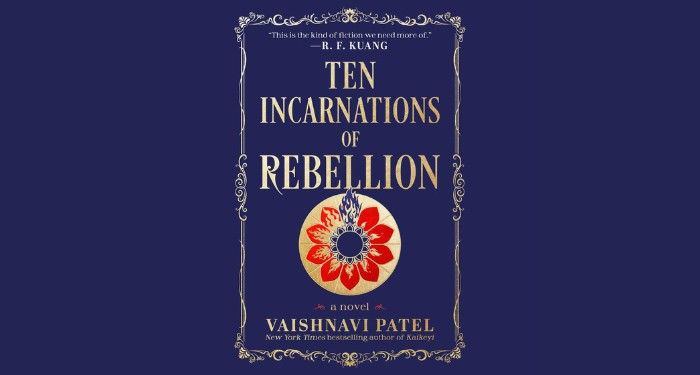Ten Incarnations of Rebellion takes place in an alternate version of 1960s India where British colonists’ brutal crackdown successfully quashed earlier attempts at independence. We meet Kalki as a teenager. Her father’s fight for freedom forced him to flee their home, and Kalki hasn’t heard from him since. Despite his rebellion liking costing his life, Kalki is following in his footsteps, in her own way. While her mother pleads for her to keep herself safe, Kalki is passionate about the fight to free India. We follow her as she gets older and learns how to best contribute to this struggle—and what she’s willing to sacrifice to the cause.
While this is not the real history of India, in the author’s note, the author explains that it is all inspired by real-life events. You can really see that complexity in the text: while there may be heroes and villains, most characters are complicated. Good people do terrible things. Terrible people act as allies in key moments.
Throughout the narrative are traditional Indian stories from religion and mythology that offer context and guidance as Kalki makes difficult decisions, including about when violence is necessary and what kind of leadership is needed in peace times.
That’s not the only disagreement between freedom fighters. When we meet Kalki, she and her friend Yashu have both been invited as star students to a government function. While Kalki is sickened by it, Yashu explains she and other people in her caste have had more opportunities under British colonialist leadership than they had prior to it. She’s skeptical that overthrowing the current regime would benefit people of lower castes. It’s a conversation they will return to many times in years to come.
Part of the reason I was originally drawn to Ten Incarnations of Rebellion was because of its queer content, and while that’s true, don’t expect a heartwarming queer romance. Patel is unflinching about the sacrifices and casualties of rebellion, and no one emerges unscathed. I did, however, enjoy the moments of queer solidarity and friendship included.
When you pick this one up, don’t skip the author’s note at the end of the book. Patel explains how she was inspired by India’s freedom fighters, including those in her own family, and how colonialism has left a wake of destruction that still damages today. She also says that she was interested in the complexities of fights like this and how “selfishness and selflessness that go hand in hand in revolution”—Kalki is so devoted to the cause that no relationship with anyone else can come close. As the author’s note says, “Ten Incarnations of Rebellion is a love letter to those who fought and an exhortation to keep fighting. The struggle is never over.”
Content warnings: Rape, violence, death, racism, homophobia.
